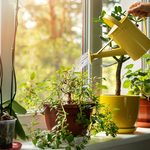Veggie Gardening for Latecomers
If you haven’t yet planted a vegetable garden, don’t worry. Summer-planted gardens grow well because the soil is warm and the risk of frost is long past. Follow these basics for planting and tending vegetables and you can enjoy fresh-from-the- garden produce until well into autumn.
Pick the Right Candidates
Pick the right crops for mid-summer sowing. Long-season crops like corn, peppers, onions and winter squash will rarely reach maturity before cold weather sets in, so these are best planted in the spring garden. You’ll also find it hard—if not impossible—to purchase transplants in July or later, so you will have to plant from seed.
Work That Soil
Work the soil well, especially if you haven’t done so earlier in the season. Vegetables prefer soil that is free of lumps or stones, and is rich in organic matter.
Plant Your Seeds Deep
Plant your seeds a little deeper than you would in spring. In some situations, the soil is so warm from successive days of sun that it can hinder seed germination. Planting deeper in the soil will help ensure that the soil is cooler and moister. These two factors are essential for good seed germination.
Water Well
Be prepared to water your vegetable garden, especially during the heat of August. While weather conditions can vary dramatically, August is often the month of heat and drought. Water first thing in the morning, rather than during the heat of day, so that foliage has a chance to dry off before nightfall. Morning waterings also allow the water to soak into the soil and reach roots before temperatures get too high by minimizing the amount of moisture lot to evaporation.
Mulch Your Garden
Mulching helps to conserve moisture in soil, keep roots cool, and prevent weeds from germinating. You can use hay or straw, shredded newspaper, sawdust, pine needles; whatever is cheap and readily available. Mulching the rows between crops is a good idea because it gives you a clean place to walk and work.
Harvest Daily
To prolong your harvests, pick produce daily. Plants such as legumes (peas and beans), squash, tomatoes, and cucumbers will keep flowering and fruiting so long as you keep harvesting. Lettuces and other salad greens will also keep producing new leaves if you pick young, tender leaves. It’s important to pick leaves when the weather gets too hot so that the plant does not become dehydrated.
Watch the Weather
Some parts of the country can receive frosts as early as late August and early September. If you live in one of those, make sure to cover your cold-sensitive vegetables when frost is forecasted.



